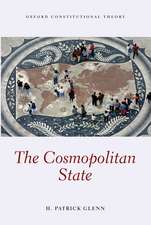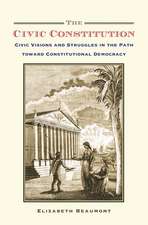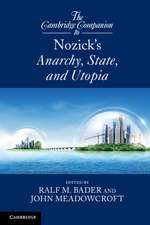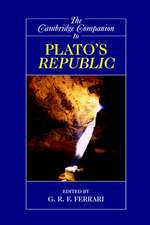Authoritarianism and Polarization in American Politics
Autor Marc J. Hetherington, Jonathan D. Weileren Limba Engleză Hardback – 23 aug 2009
| Toate formatele și edițiile | Preț | Express |
|---|---|---|
| Paperback (1) | 158.53 lei 3-5 săpt. | |
| Cambridge University Press – 23 aug 2009 | 158.53 lei 3-5 săpt. | |
| Hardback (1) | 733.89 lei 6-8 săpt. | |
| Cambridge University Press – 23 aug 2009 | 733.89 lei 6-8 săpt. |
Preț: 733.89 lei
Preț vechi: 853.36 lei
-14% Nou
Puncte Express: 1101
Preț estimativ în valută:
140.42€ • 146.63$ • 115.96£
140.42€ • 146.63$ • 115.96£
Carte tipărită la comandă
Livrare economică 15-29 aprilie
Preluare comenzi: 021 569.72.76
Specificații
ISBN-13: 9780521884334
ISBN-10: 0521884330
Pagini: 246
Ilustrații: 13 b/w illus. 30 tables
Dimensiuni: 162 x 243 x 18 mm
Greutate: 0.48 kg
Editura: Cambridge University Press
Colecția Cambridge University Press
Locul publicării:New York, United States
ISBN-10: 0521884330
Pagini: 246
Ilustrații: 13 b/w illus. 30 tables
Dimensiuni: 162 x 243 x 18 mm
Greutate: 0.48 kg
Editura: Cambridge University Press
Colecția Cambridge University Press
Locul publicării:New York, United States
Cuprins
1. Spanking or time out: a clash of worldviews?; 2. Putting polarization in perspective; 3. Authoritarianism and non-authoritarianism: concepts and measures; 4. Historical account of the roots of worldview evolution; 5. How authoritarianism structures contemporary issues; 6. Threat and authoritarianism: polarization or convergence; 7. Evidence of worldview evolution; 8. Immigration: a reinforcing cleavage that constrains the GOP; 9. What the 2008 democratic nomination struggle reveals about party polarization; 10. A somewhat different take on polarization.
Recenzii
'Hetherington and Weiler's Authoritarianism and Polarization in American Politics breaks new ground in the debate about the nature of polarization in the American public and in so doing reinvigorates the study of authoritarianism. This is an important and compelling work that will be of interest to all students of American politics.' Edward G. Carmines, Indiana University
'The once-dormant concept of authoritarianism has seen a rebirth in recent years, as scholars have begun to appreciate fully its explanatory power. Nowhere has this power been analyzed more thoughtfully than in Authoritarianism and Polarization in American Politics, where Hetherington and Weiler argue persuasively that the evolving political landscape, whose topography is often shaped by visceral issues such as race, crime, feminism, sexual orientation, immigration, and terrorism, is the inevitable result of the clashing and irreconcilable worldviews of individuals with, and without, authoritarian belief systems, who simply think about the world in fundamentally different, and polarized, ways. Perhaps the most important contribution of this book, however, is the insight that authoritarianism does not explain everything political; conditions sometimes arise that cause people with different worldviews to see the world the same way. After 9/11 a large proportion of Americans supported torture, wiretapping, and pre-emptive war. These were not fringe positions taken only by hard-core authoritarians. Rather, the authors show that reasonable people want to feel safe, too, and will support a strong hand when they feel threatened. This book will be central to our understanding of the roots and ramifications of post-9/11 politics.' Jon Hurwitz, University of Pittsburgh
'This book tackles two of the most fundamental problems in the study of contemporary American politics - the polarization of the electorate and the role, if any, of ideology in directing the political choices of ordinary citizens. It brings an entirely new light to both by bringing into view the deep psychological roots of political belief and behavior. It is a work of exceptional reach and vision.' Paul Sniderman, Stanford University
'Where political science has a long tradition of seeing political conflict through the lens of 'issues' debates about public policy, Hetherington and Weiler see the fundamental sorting process as instead a matter of personality. For them the new defining reality of American politics is a choice between authoritarian and non-authoritarian styles of reacting. The widely noted polarization of American politics is from their viewpoint a polarization between people, some of whom hold a worldview where issues are simple, choices black and white, and tradition a reliable guide to action, and others who prefer complexity, nuance, and change. Because these differences of worldview involve cherished symbols, they produce a party politics of deadlock.' James A. Stimson, University of North Carolina, Chapel Hill
'The once-dormant concept of authoritarianism has seen a rebirth in recent years, as scholars have begun to appreciate fully its explanatory power. Nowhere has this power been analyzed more thoughtfully than in Authoritarianism and Polarization in American Politics, where Hetherington and Weiler argue persuasively that the evolving political landscape, whose topography is often shaped by visceral issues such as race, crime, feminism, sexual orientation, immigration, and terrorism, is the inevitable result of the clashing and irreconcilable worldviews of individuals with, and without, authoritarian belief systems, who simply think about the world in fundamentally different, and polarized, ways. Perhaps the most important contribution of this book, however, is the insight that authoritarianism does not explain everything political; conditions sometimes arise that cause people with different worldviews to see the world the same way. After 9/11 a large proportion of Americans supported torture, wiretapping, and pre-emptive war. These were not fringe positions taken only by hard-core authoritarians. Rather, the authors show that reasonable people want to feel safe, too, and will support a strong hand when they feel threatened. This book will be central to our understanding of the roots and ramifications of post-9/11 politics.' Jon Hurwitz, University of Pittsburgh
'This book tackles two of the most fundamental problems in the study of contemporary American politics - the polarization of the electorate and the role, if any, of ideology in directing the political choices of ordinary citizens. It brings an entirely new light to both by bringing into view the deep psychological roots of political belief and behavior. It is a work of exceptional reach and vision.' Paul Sniderman, Stanford University
'Where political science has a long tradition of seeing political conflict through the lens of 'issues' debates about public policy, Hetherington and Weiler see the fundamental sorting process as instead a matter of personality. For them the new defining reality of American politics is a choice between authoritarian and non-authoritarian styles of reacting. The widely noted polarization of American politics is from their viewpoint a polarization between people, some of whom hold a worldview where issues are simple, choices black and white, and tradition a reliable guide to action, and others who prefer complexity, nuance, and change. Because these differences of worldview involve cherished symbols, they produce a party politics of deadlock.' James A. Stimson, University of North Carolina, Chapel Hill
Notă biografică
Descriere
The left and right in America are now divided by politically irreconcilable worldviews, and the root of that divide is authoritarianism.

















